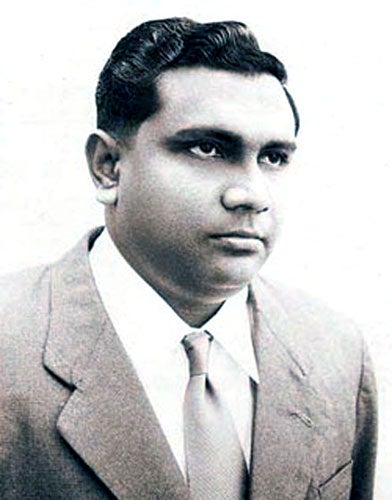Ibrahim Nasir: First President of the Maldives following independence in the 1960s

In the space of a decade, Ibrahim Nasir went from national hero to national embarrassment, a man who helped secure freedom for the Maldives only to be accused of corruption and effectively forced into exile.
Nasir was 31 when in 1957 he became prime minister of the collection of atolls that was still a British protectorate. In 1965 he signed the agreement with Britain that saw the archipelago nation – with a sultan still as head of state – secure independence. Three years later he became the new republic's first president, serving for a decade.
Many credit Nasir with helping modernise the Maldives, an impoverished nation of fishing communities that has gradually developed to become a luxury tourist destination for the world's wealthy. The Maldives' entry to the UN is also said to have been achieved by Nasir. Likewise, he was widely praised for introducing British-style education, radio and television and for building the country's first international airport.
But the prime minister-turned-president also stirred up controversy, for his suppression of political dissent and his harsh treatment of those islanders who wanted to break away and form their own republic. That secessionist movement finally died in 1964 after Britain changed its position and failed to back the short-lived United Suvadive Republic.
Nasir was born into a privileged line, coming from a royal family of former sultans. He said he could trace his lineage to the Dhiyamigili dynasty, which ruled the Maldives during the 18th century. Educated in the Maldives and Sri Lanka, he rapidly assumed a powerful position within the Muslim nation and served as premier under Sultan Muhammad Fareed Didi.
In 1968, after a decade as the country's president, public resentment of Nasir and his near-dictatorial rule was growing and there were allegations of corruption levelled at him. While these accusations were never proven they added to the already existing pressure for change, along with the faltering economy following the closure of the British airbase. A nomination process saw Maumoon Abdul Gayoom win the presidency – a position he would hold with an iron fist until earlier this year – and Nasir leave for retirement in Singapore. In 1981 he was sentenced by Gayoom, in absentia, for allegedly trying to plot a coup. There were several such allegations, though Nasir was ultimately pardoned.
Following his death last weekend, aides of Nasir said he had been suffering from a long illness. His body was flown back to the Maldivian capital, Male, where he received a state funeral, attended by both Gayoom and his recently elected successor, Mohamed Nasheed. The previous day was declared a national holiday and thousands of Maldivians turned out to see his body, lying in state.
Andrew Buncombe
Amir Ibrahim Nasir, politician: born Malé, Maldives 2 September 1926; Prime Minister, Maldives, 1957-68, President 1968-78; three times married (two sons, one daughter, and two sons deceased); died Singapore 22 November 2008.
Join our commenting forum
Join thought-provoking conversations, follow other Independent readers and see their replies
0Comments